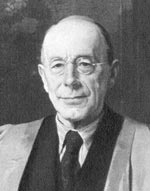| Profile | Major Works | Resources |
Sir John Harold Clapham, 1873-1946.

Cambridge economic historian.
John H. Clapham was born in Manchester, the son of a prosperous jeweller and Methodist. Clapham was educated at the Leys School, a Methodist academy in Cambridge. He enrolled at King's College, Cambridge in 1892, obtaining first class honors in the Historical Tripos in 1894 and receiving his B.A. in 1895. Clapham's essay on the causes of the war of 1792 won a prize and led to his election as a Fellow of King's College in 1898. He earned his M.A. in 1899.
In pursuit of the Historical Tripos at Cambridge, John H. Clapham had studied history under Henry Acton and William Cunningham and economics under Alfred Marshall. Of the three, Marshall had probably the greatest influence. Originally intending to specialize in the French Revolution, it was at Marshall's urging that he turned from political to economic history. Eschewing the nationalist-tinged historicism of Cunningham, Clapham embraced the free trade/laissez faire flavor of Marshall's orthodox Neoclassicism.
Failing to find a history position, at Marshall's urging, Clapham took up a chair in economics at Yorkshire College in Leeds (now University of Leeds) in 1902. It is here he began working on his Woollen and Worsted Industries and contributing economic chapters to Acton's Cambridge Modern History. It was also around this time that he came into contact with the historicist W.J. Ashley, then in neighboring Birmingham. In 1908, Clapham returned to Cambridge as dean of King's College, becoming history tutor in 1913. During the First World War, Clapham served on the Board of Trade. He was president of Section F of the BAAS in 1920, and led its committee on the gold standard, producing its famous Monetary Policy report. Although Clapham recommended an immediate return to the gold standard, his younger co-writer D.H. Robertson dissented.
Despite his Marshallian credentials, Clapham grew increasingly critical of abstract economic theory. Clapham got entangled with Pigou in a dispute over the practical relevance of Marshall's theory (the "empty boxes" debate of 1922).
J.H. Clapham went on to become the first Professor of Economic History at Cambridge in 1928.
Clapham's most famous work is probably his magisterial Economic History of Modern Britain, where Clapham set about revising the popular pessimistic image of the 19th C. Industrial Revolution (originally articulated by romanticists and socialists, and reiterated by contemporaries such as J.L. Hammond, R.H. Tawney and G.D.H. Cole) Replete with statistical data, Clapham noted that the Industrial Revolution was slower and local, rather than a rapid national event, that the British government was not ignorant and neglectful, but quite aware of it and undertook measures to mitigate its impact, and, contrary to romantic anti-industrial rhetoric, Clapham asserted that wages and standards of living for most of the English urban working class (save for hand-loom weavers) had risen significantly throughout the period. Clapham's optimistic interpretation kicked off a debate among economic historians that would continue through the 1960s.
Clapham was the spearhead behind the notable Cambridge Economic History of Europe series, that began to appear in 1941. He also authored an official history of the Bank of England.
He was succeeded in his Cambridge chair by M.M. Postan.
|
Major Works of John H. Clapham
|
|
HET
|
|
Resources on John Clapham
|
All rights reserved, Gonçalo L. Fonseca
